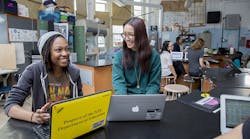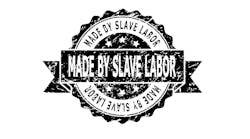ProMat 2019: Change the Dialogue, Provide Training and Girls Will Help Fill Job Gap
Reshma Saujani, CEO and founder of Girls Who Code shocked the ProMat audience -- well at least a number of us in the audience - with a simple cartoon.
It was a scene depicting Barbie, the iconic doll, telling her sister Skipper that she’s designing a video game. To those of us of a certain age, we are glad to see she has stopped brushing her hair and is doing something useful. But just as our hopes rose, they were dashed when she told Skipper that she’ll need Steve and Brian to “turn it into a real game.”
“This is what our young girls are seeing and what they end up believing,” explained Saugani, a keynote speaker at ProMat 2019. “And we wonder why they aren’t choosing STEM careers.”
Saugani has changed that perception, however. She founded Girls Who Code in 2010 when she became the first Indian American woman to run for U.S. Congress. During the obligatory visit to local schools, she noticed the gender gap in computing classes. Vowing to change this she started founded the organization and in fact created a national movement.
She told the audience that there is, in fact, an untapped source to fill the skills gap that continues to plague their businesses -- women.
Computing is where the jobs are, she said, and where they will be in the future, but fewer than 1 in 5 computer science graduates are women. That wasn’t always the case. In 1995, 37% of computer scientists were women. Today, it’s only 24%. “If we do nothing, in ten years the number of women in computing will decrease to just 22%.”
With the goal of turning this trend around and “building the largest pipeline of future female engineers in the United States,” the organization has created a variety of hands-on programs. These programs are designed to reach students as far back as elementary school. For the younger potential technical employees, 33rd through 5th grade, there is a free after-school program. Girls in 6th through 12th girls can take a two-week summer coding classes across the country.
There is also a Summer Immersion Program which is a free 7-week introductory computer science program for 10th-11th grade girls. During the seven-week program, participants learn about computer science, and gain exposure to tech jobs.
At the college level there is a program called College Loops was are campus student organizations led by a president who serves as the main point of contact for Girls Who Code. College Loop presidents are committed to reaching gender parity in tech by creating an inclusive community on their campus.
These programs are paying off. The organization has reached 185,000 girls since 2010. The group’s alumni, who have already declared their majors, are choosing to major in computer science, or related fields, at a rate 15 times the national average. In its annual report, released in April of 2018, the group says it is on track to achieve gender parity in entry-level computer science jobs in the United States by 2027.
But more work still needs to be done, says Saujani. “We need to continue to evolve the culture of how we educate our girls. There is still a bias in which girls require perfection of themselves and so don’t take the chances and risks that boys do and therefore don’t choose fields that they feel they won’t excel in. We have to teach our girls to explore more, fail more and be open to all possibilities.”



